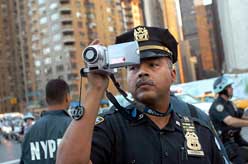Civil Liberties, Guantanamo, Military Tribunal, Supreme Court, Targeting Muslims, Torture, Truth to Power
Podcast: Play in new window | Download


Why Did Pulitzer Ignore Juan Gonzalez’s Reporting on Air Quality at Ground Zero?
Co-hosts Michael Ratner and Michael Smith commend the valuable investigative journalism by columnist and Democracy Now cohost, Juan Gonzalez. Gonzalez had written extensively about the air quality at Ground Zero after September 11th. Read more here. Here is an archive of Juan Gonzalez’s columns.
Co-hosts also discuss Supreme Court partial birth abortion ruling (PDF) and Michael Ratner‘s trip to Paris and the follow up on the case brought against former US Secretary of Defense Donald Rumsfeld in Germany.
—-


Drug Provision of the Higher Education Act
A coalition of groups including criminal justice, drug treatment, health organizations are seeking to repeal the Drug Provision of the Higher Education Act. It’s a 1998 law that delays or denies federal financial aid to people convicted of state or federal drug offenses. Since the law took effect in 2000, 200 thousand students have been denied financial aid. According to the Department of Education, that’s one in every 400 students rejected who apply for federal aid.
As a result, these young students, having already been punished for their offenses are now dropping out of school or reducing courses. Today, there are more than 300 organizations working to overturn this law.
Guest – David Borden, Executive Director of the Drug Reform Coordination Network. David’s been very active lately in lobbying to repeal the Drug Provision of the Higher Education Act (also known as the “Aid Elimination Penalty)
—-


Amnesty Report on Guantanamo Bay Prison Conditions
Earlier this month, Amnesty International released a report detailing the horrid prisoner conditions at Guantanamo Bay, Cuba. The report includes descriptions such as extreme isolation, sensory deprivation, solitary confinement 22 hours a day, and 24 hour lighting. Eighty per cent of the approximately 385 men currently held at Guantánamo are in isolation. Amnesty International also reports that the cells have no windows to the outside or access to natural light or fresh air.
Amnesty International is also calling on the government to allow independent health care professionals into Guantánamo to examine detainees in private and to allow visits by independent human right organizations and UN human rights experts.
Co-host and Amnesty International Director of the USA program, Dalia Hashad reads an excerpt from Bisher al-Rawi’s moving letter to free Guantanamo prisoners.
Guest – Shane Kadidal, an attorney with the Center for Constitutional Rights.
—-
Civil Liberties, Surveillance, Targeting Muslims, Truth to Power
Podcast: Play in new window | Download

Communication Lockdown – Communication Management Units
The Justice department has quietly opened a new section of a prison that detains mostly Arab muslims with a strict lock down on communication to the outside world. The Communications Management Unit or CMU is located in Terre Haute, Indiana. All communication with the outside is strictly monitored at the medium-security facility.
In April of last year, the US Federal Bureau of Prisons, part of the Department of Justice, proposed a set of strict new regulations and, as required, there was a period of public comment. Human rights and civil liberties groups voiced strong concerns about the constitutionality of the proposed program.
The program originally proposed was said to be applicable only to terrorists and terrorist-related criminals. The American Civil Liberties Union, however, along with a coalition of other civil liberties groups, objected to the language of the regulation as too broad, and potentially applicable to non-terrorists and even to those not convicted of a crime but merely being held as “witnesses, detainees, or otherwise.”
Guest -Howard Kieffer, a defense lawyer and Executive Director of the Federal Defense Associates.
—-


Co-Host, Dalia Hashad Speaks About The CMU At The Left Forum 2007
The panel was titled, Bush and Company’s War on Civil Liberties and What It Means for Our Future. Here Dalia describes aspects of the communicaton lockdowns at the CMU. The CMU is a secretive new prison program segregating “high-security-risk” Muslim and Middle Eastern prisoners, tightly restricting communications with the outside world.
—-

Newark Public School District Holds Graduation at Baptist Church – NJACLU Sues
The ACLU of NJ is suing the Newark public school district for holding graduation ceremonies in a Baptist church. One plaintiff in the case, he’s a Muslim student, says he’s not going to enter into the building because of the religious images. Forced to choose between entering the Baptist church or missing graduation, he missed his graduation. When the ACLU of NJ threatened to sue the Newark school district previously for this same issue, they promised to move the graduation ceremony. The New Jersey ACLU says the case is a living example of why the New Jersey Constitution makes it clear that the government should neither favor nor discriminate against religious practice.
Guest – Ed Barocas, Legal Director of the New Jersey ACLU and lead attorney on the case.
Guest – Rob Boston, Assistant Director of Communications for Americans United for Separation of Church and State.
—-


Hi-Tech Surveillance, Eroding Civil Liberties and Dissent – Michael Steven Smith
We hear an excerpt from a speech delivered by co-host Michael Smith at the Left Forum 2007. The panel was titled, Bush and Company’s War on Civil Liberties and What It Means for Our Future. In his speech, Michael Smith describes the wider picture of how hi-tech surveillance together with eroding civil liberties and police spying has seriously affected dissent.
Civil Liberties, Guantanamo, Military Tribunal, Surveillance, Torture, Truth to Power
Podcast: Play in new window | Download


Update:
- US Supreme Court Rejects Appeal (6-3 vote) From Guantanamo Detainees
- Co-hosts Michael Ratner and Michael Smith discuss the recent ruling by the Supreme Court to reject appeal from Guantanamo detainees who are challenging their five-year long confinement. Once again, Habeas Court is at stake. Michael Ratner says “If we had Habeas Corpus hearings, Guantanamo would be cleaned out in 24 hours.” Both co-hosts discuss what’s at stake as the US Supreme Court rolls back some 800 years, a fundamental pillar of justice. Habeas Corpus.
—-



Red Light For Stop Light Systems
Surveillance Creep: Across the United States, from Minnesota to Texas, a host of cities have installed automated systems to catch vehicles that run red lights. A photo is taken of the speeding car’s license plate and a citation is sent to the owner. Owners can contest it by showing that the car title had been transferred or by telling people the name of the person driving at the time. In Minneapolis, the police who manage the program said it issued 26,000 tickets in six months and reduced accidents by 16 percent at the intersections where cameras were posted.
But cities are finding problems with some of these devices. Lubbock, Texas for example has delayed installation of red light cameras after the discovery of shorter timed yellow lights. Also in Iowa. Residents felt this was an attempt to get more money…short yellows assure a steady flow of red light camera ticket revenue. And in Minneapolis, the program has reached its own red light. In mid-March the ACLU scored a victory in court, when a judge found the automated system, called Photo Cop, illegal. Photo Cop ticketed vehicle owners, not the drivers, which uniformity of Minnesota laws governing moving violations.
Guest – Howard Bass, a Burnsville attorney, he argued the case for the ACLU of Minnesota.
—-



Courts Relax Laws That Protect Expression of Free Speech From Police Spying
Unrestrained police surveillance has crept back into the lives of civilians at an alarming rate. Normally held in check by court settlements or consent decrees, city officials and courts are increasingly diluting the power of such agreements. A consent decree will help restrain overreaching law enforcement and permit the exercise of free speech.
In New York City, since 1986 police must follow consent decree guidelines when investigating individuals engaging in First Amendment activities. We may not have had these guidelines were it not for a lawsuit brought by Barbara Handschu Known as the Handschu Settlement, it was agreed to in 1980 by a plaintiff class numbering in the millions and the New York City Police Department.
Twenty-two years after the settlement was signed, the NYPD asked to modify it, saying it was too restrictive, and would inhibit terrorism investigation. U.S. District Court Judge Charles Haight agreed with the NYPD.and relaxed the guidelines.
And what’s happening in NY is also happening around the country.
Take Chicago for example. .In 2001 the 7th Circuit U.S. Court of Appeals stripped Chicago’s consent decree. It was signed 25 years ago. Now, city officials say it impedes investigations of gang activity. No longer are police deterred from spying on, or disrupting the constitutionally protected activities of political groups.
Historically, court settlements and consent decrees have held in check unfettered police abuse of First Amendment freedoms. But under the Bush administration, attorneys general have actually marginalized these important decrees. We’ve watched the Justice Department LIFT existing decrees, preferring to enter into less formal understandings with police. In so doing, the judicial branch of our government acts as a national conspirator with local police departments in violating our collective civil rights.
Guest – Paul Chevigny, law professor at New York University and one of the lawyers involved in NY’s historic Handschu lawsuit.
—-
Civil Liberties, Guantanamo, Military Tribunal, Surveillance, Truth to Power, Uncategorized
Podcast: Play in new window | Download

Update:
- Co-hosts Michael Ratner and Dalia Hashad discuss the key elements of the David Hicks military tribunal. They describe how two of the three lawyers representing were dismissed by the judge leaving attorney Major Michael Mori as counsel. David Hicks has become the first Guantanamo prisoner to plead guilty under the Military Commissions Act passed last year.
- Hosts describe the plea deal that was made with military prosecutors and Hick’s role training with the Taliban under the Pakistan Inter-Services Intelligence ISI.
—-


An International Witchhunt: Police Spy on Protestors Before RNC Convention in New York City
A national and international effort was launched by police and intelligence to spy on protesters before the Republican National Convention in 2004. According to the New York Times, teams of undercover officers were sent across the US, Canada and Europe to spy on groups and individuals planning to take part in the protests in New York. Specially trained officers part of the “RNC Intelligence Squad,” posed as activists as they targeted anti-war organizations, environmentalists and artists.
Guest – Donna Lieberman, Executive Director of the NYCLU
—-

Disorder in the Court: Great Fractured Moments in Courtroom History
Co-host Michael Ratner, reads from Disorder in the Court: Great Fractured Moments in Courtroom History These are what people actually said in court, word for word, taken down and now published by court reporters who had to keep a straight face while these exchanges took place. Get ready to laugh.
—-


2006 Study Shows Half A Million People Stopped on New York City Streets
Last year New York City police stopped more than 500 thousand people on city streets. 2006 statistics show a near doubling in the average number of arrests as a result.
Of those stopped last year a disproportionate 55 percent were black and 30 percent were Hispanic. As mentioned here at length on previous Law and Disorder programs, the NYPD continues to build a database on each street stop. A database with information most likely shared with intelligence agencies around the world.
——————————————————————–
- Click here to read the NYCLU’s letter and the NYPD order (PDF).
- Click here to read the NYCLU’s palm card “What to Do If You’re Stopped by the Police”.
Guest – New York civil liberties Executive Director Donna Lieberman.
Guest – Deborah Small, Executive Director of Break the Chains, an organization that seeks to build a national movement within communities of color against punitive drug policies.
Civil Liberties, Extraordinary Rendition, Guantanamo, Iraq War, Surveillance, Torture, Truth to Power
Podcast: Play in new window | Download

Combatant Status Review Tribunals
Co-hosts Michael Ratner and Dalia Hashad discuss the legal efficacy of these tribunals for Guantanamo Bay detainees. From the Amnesty International USA site – “In the “war on terror”, detainees in US custody have been treated as potential sources of information first and criminal suspects a distant second. However, this secondary aspect is now coming into focus. Plucked from years of secret or virtually incommunicado detention, a few people held in the US Naval Base at Guant?namo Bay in Cuba are facing trial by military commission.”
Combatant Status Review Tribunals Proceedings:
- Detainees do not receive the presumption of innocence.
- Detainees do not get access to legal advice.
- Detainees are not entitled to access to the evidence against them, or in their favor.
- Hear-say evidence is allowed to be used against the detainees.
- The use of evidence acquired through coercive interrogation is allowed, there is no protection against self-incrimination.
- Evidence acquired through the torture of other suspects was allowed.

Architect of Torture
Co-host Michael Ratner adds perspective to the real reasons US Attorney General Alberto Gonzales should resign immediately.
————————————————————–
Law and Disorder sit down with authors Giuliana Sgrena and Anthony Arnove.




It’s two years since U.S. forces gunned down Italian intelligence agent Nicola Calipari in Iraq, and recently Washington is refuses to hand over the U.S. soldier charged in the case to be tried in Italy. Calipari the number two man in the Italian military intelligence was killed while escorting Italian reporter Giuliana Sgrena after securing her release from a month-long abduction in Iraq.
Giuliana Sgrena has written about her experience in, “Friendly Fire: The Remarkable Story of a Journalist Kidnapped in Iraq.” As a veteran foreign correspondent for the Italian newspaper Il Manifesto she has reported frequently from Afghanistan and Iraq. Sgrena joins Michael Ratner and Michael Smith today on Law and Disorder. We are also joined by editor and author Anthony Arnove who recently wrote the new book Iraq: The Logic of Withdrawal.

Left Forum 2007 – CCR Executive Director Vince Warren
We play part of a speech by the Center for Constitutional Rights Executive Director Vince Warren. He spoke at the Left Forum earlier this month on the state of current state civil liberties in this country. The panel, moderated by our own Michael Steven Smith examined the long term implications of eroding civil liberties and the laws that have allowed a surveillance police state. We will hear more speakers from this years Left Forum in the weeks to come.




























